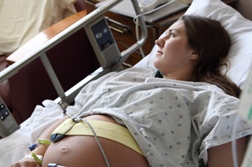EPILEPSY AND PREGNANCY
A Litany of Depakote Birth Defects that Are Not Fetal Alcohol Syndrome
| July 13, 2010. By Jane Mundy | |
 Cindy (not her real name) says her daughter was diagnosed with fetal alcohol syndrome because "she has six of the 10 facial characteristics" that define the syndrome. Sonja, another mother who took Depakote while pregnant, was also told that her son had fetal alcohol syndrome—but Sonja doesn't drink at all. Could other doctors mistakenly diagnose Depakote birth defect cases for fetal alcohol syndrome?
Cindy (not her real name) says her daughter was diagnosed with fetal alcohol syndrome because "she has six of the 10 facial characteristics" that define the syndrome. Sonja, another mother who took Depakote while pregnant, was also told that her son had fetal alcohol syndrome—but Sonja doesn't drink at all. Could other doctors mistakenly diagnose Depakote birth defect cases for fetal alcohol syndrome?There is a litany of adverse events possibly connected with Depakote.
Susan (not her real name) has an eight-month-old son with an underdeveloped right ear. "He has no ear canal and is deaf in that ear and one side of his face is larger than the other," she says. Her son has craniofacial microsomia, a congenital disorder that typically affects the development of the lower half of the face, including the ears. It can lead to breathing difficulties and is the second most common facial birth defect after clefts.
Two other mothers reported that their children were born with cleft palates. "I took Depakote for seizure disorder before and during pregnancy," says Denise. "My baby was born with a soft cleft palate. He needed soft cleft palate repair surgery in 2008 and currently has a delay in speech development."
Kimberly says: "I was being prescribed Depakote for epilepsy and when I became pregnant I was taking 1500mg a day. When I phoned my doctor's office to tell him I was pregnant, he instructed me to continue the drug. A few weeks later I had a miscarriage."
Since Depakote was approved in 1983, the FDA has received six cases of developmental delays, including two siblings reported to have autism. The agency reviewers said it "raises concerns" (6/26/09), but then added, "Further study is needed to further elucidate causality and degree of risk of fetal exposure to (Depakote) and subsequent developmental delay in children."
The drug carries a black box warning alerting users to potential birth defects. Yet a recent study found that "Sodium valproate exposure during pregnancy more than doubles the risk for a major congenital malformation (MCM) in the fetus compared with carbamazepine or lamotrigine," which are also anticonvulsants frequently prescribed for seizures (July 2010: the UK Epilepsy and Pregnancy Register and preliminary results from the European and International Registry of Antiepileptic Drugs in Pregnancy).
The FDA recently sent a letter to neurological and obstetric health workers warning that valproate sodium (marketed as Depacon), valproic acid (marketed as Depakene and Stavzor), divalproex sodium (marketed as Depakote, Depakote CP and Depakote ER) and related products have been shown to increase the risk of cardiovascular malformations, craniofacial defects, neural tube defects and other major birth defects when taken by pregnant women.
Because neural tube defects often develop before a woman even knows she is pregnant, the FDA issued a further warning in December 2009 to "women of childbearing potential." But what about all the women like Cindy who took Depakote before knowing they were pregnant? Those women who were never warned about Depakote and never given the option of taking carbamazepine or lamotrigine?
I was one of these pregnant women who was prescribed a high dose of valproate sodium by my neurologist when I was pregnant. I wonder if it was known or unknown to my neurologist of the potential variable birth defects that could possibly be caused by depakote when he was increasing my depakote intake. He reasoned that it was apt to increase dosage strength to curb chances of seizures happening during pregnancy and since depakote had controlled my seizures well, a need to change my anticonvulsant drug was not deliberated. Thankfully my child was born normal.
Whilst it is important for neurologists to help epileptics lead well controlled seizure free lives by prescribing appropriate AED drugs, it is also pertinent that neurologists make known side effects of drugs to patients. On patients' part, patients must ask neurologists about pros and cons of drugs prescribed, read instructions and labels on packing of drugs and search/read up more information about drugs which can be obtained from medical websites,
.








No comments:
Post a Comment
Please write your comments here